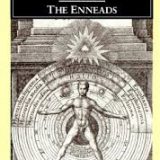The Six Enneads – Plotinus – 250 CE
Reviewed by: Michael Sympson Date: 15 September 2001
The ultimate sky-hook.
Readers of mine may notice that I rarely speak of fiction and prefer the term “imaginative literature.” Plotinus, by trade, was a philosopher and some of the greatest in his profession, apart from unusual powers of reasoning, are not exactly conspicuous for their imagination. But others did great and displayed fertile imagination and linguistic felicity. Even if totally refuted in a strictly philosophical sense, their work remains to be a source of inspiration and a joy to read.
Plotinus began publishing in the advanced age of 49. His work became the hidden nursery of Christian theology; something he certainly didn’t intend. The radical apologist Tatian, in his address “Against the Greeks,” expressed a very common sentiment among Christians when he said: “I am not to worship His creation made for our use. The Sun and the Moon were made on our account. How then shall I worship my own ministers?” Plotinus, usually never shrill, replied in strong terms:
“Human temerity is only too willing to accept such grandiloquent coaching. The simple folk hears:
“People whose worship is inherited from antiquity are not His children – you are! So you address the lowest of men as brothers, but you deny this courtesy to the Sun and disown your ties with the Cosmos?” Plotinus created the last great synthesis of antique philosophy. It combined Plato’s theory of Ideas with a doctrine of emanation, a constant flux of creative energy from the primeval One through several agencies all the way down to humans, animals, and matter in states of lesser reality.
In this vision even the polytheistic pantheon participates in the ultimately undivided unity of the cause for our existence. Plotinus’ reasoning is not difficult to follow, but for us modern semi-barbarians, his discerning subtlety often seems to verge on empty verbiage. However the basic premise is endearingly simple: “It is unity that makes a being. The members of every plant and animal form a unity; separation means loss of existence.” History has been written by the victorious, so our views reflect the dim opinions of paganism’s worst enemy; but let me assure you, in their days, the Pagans had the better thinkers on their side.
So, once in the saddle, Christians went on the offensive. Egged on by their bishop, Alexandria’s mob flayed alive the philosopher Hypathia in her own lecture-hall, because she was a mathematician, a philosopher, a pagan, and – what in the eyes of her Christian opponents was her worst sin – a woman. Two centuries later, Emperor Justinian, the bigot, switched off the lights, and drove Athen’s last philosophers into exile. It took a treaty with foreign powers, that the last pagan intellectuals got permission to go home to their families and end their lives in peace and darkness.
Plotinus was always honest about the possibility to actually get it wrong: “Consider sense knowledge: its objects seem most patently artified, yet the doubt remains whether the apparent reality may not lie in the states of the percipient rather than in the material before him.” He even seems to have anticipated the modern concept of gravity: “The heavens, by their nature, will either be motionless or move by circle; all other movement indicates outside compulsion.”
In a series of papers from 1969-1978, Professor Robert Fischer (not the chess-champion) made explicit reference to Plotinus’ description of his mystical ecstasy. Based on controlled experiments with mind-enhancing substances, Fischer mapped out an ascending continuum of nervous arousal that bridges the state of meditative torpor on one end with the surrender to white hot hysteria on the other. Such ecstasy occurs when amphetamine or LSD or some kind of prayer discipline breach the amnesic state boundaries, that structure our layers of memory and cause an overload of data which freezes the mental “hard drive.”
In Plotinus’ own words: “Abandon the duality of seer and seen, and count both as one, so that he in its vision does not distinguish, nor even imagines a duality. He has changed, does no longer own himself, but belongs to the One, a centre joined with the centre. He will behold a solitary light suddenly revealing itself – not from some perceived object, but pure and self-contained. We must not enquire its origin, for there is no “origin.” The primal One does not come on cue, it is not like one who enters, but who is eternally present. Like one who has entered the temple’s inner sanctuary and left the images behind, the self is perfectly still and alone. This is liberation from the alien that besets us here …”
Plotinus enjoyed this experience only four times in the five or six years that his biographer Porphyry knew him. Given the choice, I am not quite sure, whether I really would like to relinquish my distance as separate observer, but it is a noted fact, that everyone who ever “returned” from the bright light of such schizoid stupor (which includes so called “near death experiences”) did so with deep regret. It is a fact of our empirical existence, though not the uplift by some numinous sky hook, as Plotinus would like us to think. Still, the most fantastic of all philosophies could actually be the most realistic description of the intellect and its evolution, to date.
“The Universe is organized, effective, complex, lavish, but it cannot be at once symbol and reality. As we look upon the world, its vastness and beauty and the order of its eternal march, and think of the gods seen and hidden, and the life of animal and plant, let us ascend to its archetype, to the yet more authentic sphere of unsoiled intelligence. That archetypal world is the true Golden Age, age of Kronos, who is the Intellectual-Principle, the exuberance of the One.” Paganism at its best.















